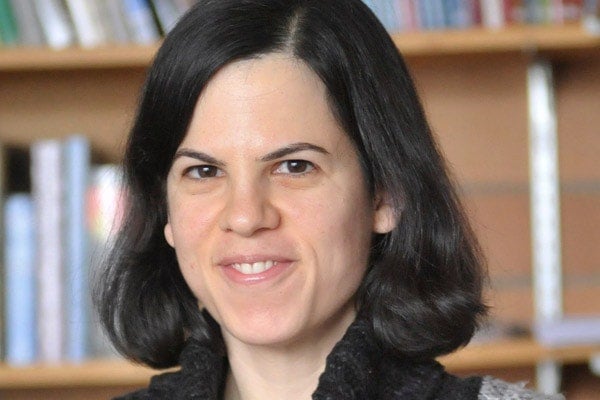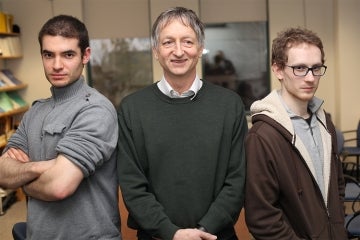
Natalie Rothman: Brokering Empire
Published: November 7, 2012
The University of Toronto Scarborough’s Natalie Rothman is the winner of two of the most important prizes awarded by the American Historical Association for her book Brokering Empire: Trans-Imperial Subjects Between Venice and Istanbul.
Rothman, an associate professor of history in the department of historical and cultural studies at UTSC, won both the Adams Book Prize and the Marraro Book Prize for the work, which explains how the modern distinction between Europe and the East began to take shape in sixteenth century Venice.
“The AHA is the world's largest and most important professional association for historians and these are the single best prizes for books in the field. To win one book prize is significant; two is truly extraordinary,” says department Chair Dan Bender.
The following is a condensed excerpt from an interview with Rothman by writer Kurt Kleiner.
A lot of the research in this book had to do with brokers. Can you talk a little bit about what brokers were, what their function was?
There are different kinds of brokers in this book, but perhaps the paradigmatic brokers that you're referring to are commercial brokers - people who helped foreign merchants do business in Venice. What interests me about these people is that for the most part in the period we're looking at they are themselves immigrants, whether they fled Venetian colonies as those were conquered by the Ottomans, or whether they moved for a variety of other reasons from the borderlands to Venice proper. Some of them were converts, from both Judaism and Islam. So these are people who themselves have a certain kind of ambiguous relationship to this boundary between what is Venetian and what is Ottoman.
And they also have this ambiguous position economically. Many of them were fairly poor, whether these were merchants who had lost their fortune, or people who were new immigrants and very limited in their resources; but they find themselves in a position of great power and authority because they're not only responsible for brokering trade, helping people sign commercial deals, but also taxing these foreigners and kind of keeping tabs on them, making sure they're not doing anything that the state isn't happy about.
But these brokers themselves end up not necessarily playing the role that the state had designed for them, and they do all kinds of things that defy the moral boundaries that the Venetian state assumes are already in place. That is, they don't play by the rules of, if you're a Christian you're only going to make partnerships with Christians, and they do all kinds of things that suggest to us that people of various ethnic and religious backgrounds were working very well with one another. That goes against this logic that prevails in modern economic scholarship that ethnic identity would a priori define partnership, that it defines a sense of affinity and trust. So I'm working here against a very developed literature that assumes the Jews only did business with other Jews and Armenians only did business with other Armenians, and I show how it was often Armenians and Greeks and other people from the Ottoman/Venetian borderlands who helped integrate Ottoman merchants into the Venetian economy. I also show how a lot of the business transactions depended on certain kinds of intimacies. Living together, eating together, spending a lot of time just socializing, and that the border between what is economic and what is social was very fraught and very difficult to monitor, which was precisely the problem for the state.
One of your opening examples had to do with a broker who was also a landlord to Muslim tenants.
He's one of my favourite characters. The reason we know about him was because he actually had to appear in front of the inquisition and justify his actions, because as it turned out he was not only lodging Ottoman Muslim merchants in his house. He and his wife were actually helping these Ottoman merchants hide slave runaways and whisk them off to the Ottoman Empire. When the master of one young runaway slave who ended up in their household came searching for him it set off a trial. So here is a case where we see these misalliances suddenly becoming visible to us thanks to the inquisitorial record. It also turned out that the broker’s wife had allowed their toddler daughter to play on the stairs to the merchants' quarters. The merchants were offering this kid food and the food may not have been exactly OK for the child to consume, particularly because this was a Friday and this was meat. There are all kinds of religious boundaries expressed through the sharing of food, the exchange of signs of affection, those kinds of things.
This is a case of the authorities trying to impose these categories that these people didn't necessarily accept or see as important. Is that right?
To some extent yes. But for me it is important to show that this is not just the story of imposition from above, but that these trans-imperial subjects in some cases are colluding with and promoting this logic of divide and rule. Not just perpetuating it, but in some cases initiating the process. This particular broker I referred to, after the trial he comes to the government and says, how about if we start a hostel for these foreign merchants to keep them separate from Christian households? So in a way he's playing a really interesting double role here, kind of reinforcing certain emerging ideas about how Muslims are very different, how they have different customs and habits. Actually a few decades later, but as a direct response to his plea, we have the establishment of the Ottoman Exchange House where all Ottoman Muslim merchants are required to live.
What conclusions did you draw?
There are two things. At the level of analysis it's really about debunking this romanticized view of people who move across boundaries as a bridge, as those who inevitably can bring together units that are in conflict with one another. The way I see these subjects is that they are quite crafty, many of them, and they can play an important role in dividing and emphasizing difference rather than similarity.
But perhaps more important than this specific analytical point, there is to me something that's politically very important that has to do with my own background, which is to break out of this clash of civilizations model, which is so pervasive in our world. And it's something that I try to do in my courses as well. Let's historicize this idea of Western civilization and realize there's nothing inherently well-bound and unique about the West, and that the West itself is kind of a shifting category. And that things like the Renaissance that many now think of as part of a uniquely Western heritage are actually part of a very complex set of interactions that deeply involves the Ottomans, and other parts of the world as well.
It's about realizing that Islam and Christianity are not monolithic things that have always been in conflict with one another. In this period you could in fact be a very devout Christian and a very loyal Ottoman subject. This idea of Islam as something that is distinctly non-Western is really a later invention, and we need to develop a new vocabulary for thinking about religious difference and about linguistic and ethnic difference and not assume that they always mapped onto one another.
You mentioned because of your own background these are questions you're interested in. Do you mean your academic background or personal background?
Both. Personally I grew up in Israel, a state that has gotten a lot of mileage out of precisely this rhetoric, that we're a bastion of Western civilization in a hostile world. And the state perpetuates these myths and perpetuates the deep inequalities that are enabled by them. And while I always found it very disturbing I didn't necessarily have the historical background to understand how far back these things go and how they also changed over time. So even though I steer clear of the more recent history of the Middle East because I find it too painful and too difficult keep the analytical distance needed to do it properly, I do think of my book as in some way a critique of the present, and a contribution to the rethinking of these ideas about clash of civilizations. If students read this and think more critically the next time they hear someone talking about Islamofascism or the next time someone talks about the democratic ideals of Western civilization then I've really done my job.



